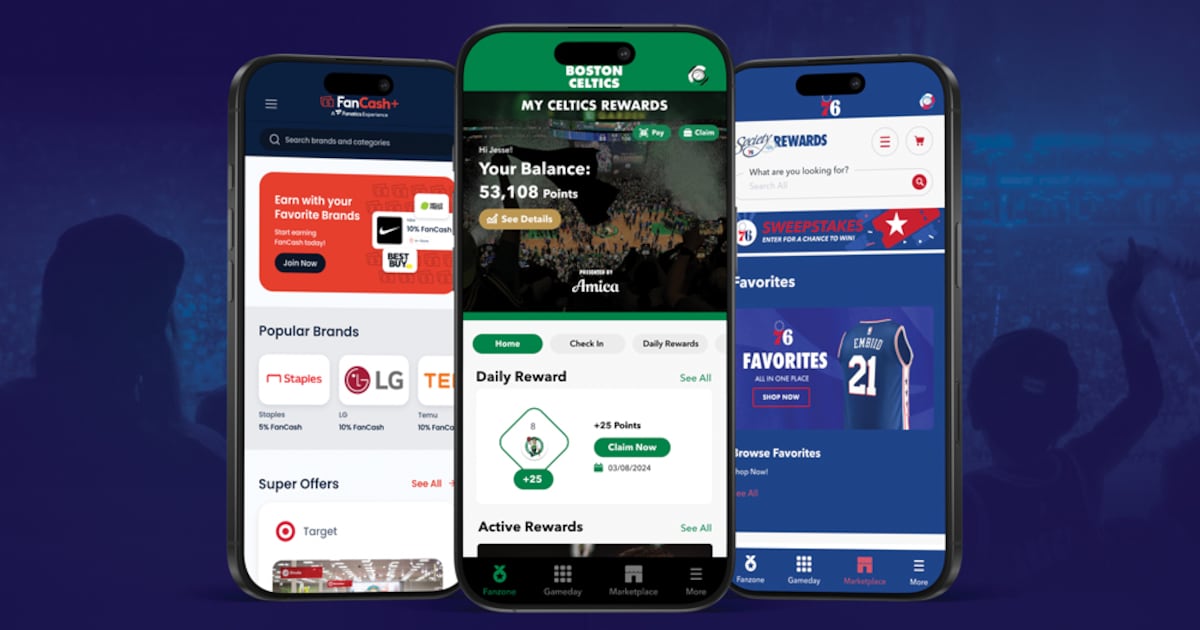Streaming platforms have never been more critical in the life of a sports fan.
The past several years have seen more sports go to streamers than ever before. Big tech companies have become entrenched in sports rights deals, picking up packages alongside traditional linear networks. Sports are just as likely to link up with Amazon or Netflix as they are with ESPN or Fox.
Not to be outdone or left behind, all the major linear networks now have their own streaming services, or will be launching them shortly. August 21, 2025, is a seminal day in the history of ESPN as the Worldwide Leader in Sports finally launches their streaming platform for cord-cutters. And even Fox, long the a holdout alongside ESPN in the digital race, will be launching their Fox One streaming service the same day.
Much of the exponential rise in streaming has been built on the supply and demand of sports fans. Each streaming platform has counted on live sports to draw subscriptions and raise revenue by airing exclusive sporting events. Sports is by far the most effective carrot a media company can hang to get sign-ups and, even more importantly, keep them on board.
But that reliance has also led sports fans to a number of subscriptions and paywalls that feel like taking on the most difficult American Ninja Warrior course. It’s almost impossible to keep track of what sport is going on where, what the best value propositions are, and the true cost of being a sports fan.
So if you’re looking for a way to navigate through the maze of streaming platforms as a sports fan, this list is for you. It is a list of every major streaming platform ranked by the best value provided to fans. Like any internet list, it’s subjective. So you won’t see any FAST channels or free services here. And the sports you desire may be higher or lower than our list. For instance, if you’re a UFC megafan, Paramount+ will soon be your go-to streaming service. But we’ve tried to rank these by the best overall popularity of the sports provided, matched up with their monthly subscription costs.
9) DAZN
Cost: $29.99 per month, or $19.99 per month for an annual contract.
Live Sports: Soccer, boxing, combat sports
DAZN is a much bigger platform internationally than in America, where it hardly registers in the greater sports ecosystem. Perhaps its biggest deal was found in televising the recent Club World Cup, but that entire tournament was hardly a must-see, even from hardcore soccer fans. Their flagship sports are found in boxing and MMA, but the vast majority of those events are far from headliners. The rest of the DAZN schedule reads like what ESPN would show during their Ocho marathons at a cost that anyone outside of the most diehard combat sports fans would find insane to consider.
8) Apple
Cost: $9.99 for Apple TV+ per month, $99 for MLS Season Pass, $79 with Apple TV+ subscription
Live Sports: MLS, MLB Friday Night Baseball, potentially F1
While other tech giants have dived head-first into the deep waters of competing with major media companies for live sports rights, Apple has taken a far different approach. Apple’s portfolio revolves around the landmark MLS Season Pass deal. We finally gained some insight into just how well MLS Season Pass is doing on Apple this year after a total lack of transparency. MLS is getting a good amount of money from Apple and benefiting from global exposure (especially with Lionel Messi), but it’s sacrificing accessibility on the home front. Overall, Season Pass is a very good and dedicated product for MLS fans.
Beyond the MLS deal, Apple is a non-factor in live sports. Its Friday Night Baseball package may go by the wayside soon. And while they are thought to be the future home for American F1 rights after the success of their movie starring Brad Pitt in theaters, it runs completely counter to their MLS strategy. Instead of owning global rights for an American league, Apple would take a worldwide series and air it only for an American audience. Even with F1’s growing fanbase stateside, it’s hard to see fans rejoicing that the series would go behind a streaming paywall after airing successfully for years on ESPN, especially with no other live sports to offer.
7) Netflix
Cost: $7.99 per month with ads, $17.99 per month standard
Live Sports: Christmas Day NFL, WWE Monday Night Raw, boxing, potentially Home Run Derby
Let’s be honest, if you’re subscribing to Netflix, you better not be doing it just for live sports. The truth is the portfolio here is only slightly above Apple in terms of content offered, but at least it’s of a premium quality. Netflix entered into a relationship with the NFL to air its Christmas Day games, which was a monumental milestone for both sides. Additionally, the global deal to televise WWE Raw was a watershed moment for the streamer, entering into live weekly sports entertainment for the first time.
Otherwise, Netflix is committed to their event-focused model by being very selective with their rights and making a move for one-time events that have wide appeal, like Jake Paul vs. Mike Tyson or their reported interest in the Home Run Derby. That reputation will only be enhanced in the upcoming years with rights to the 2027 and 2031 Women’s World Cups.
6) Fox One
Cost: $19.99 per month, $199.99 annually
Live Sports: MLB, NASCAR, college sports
At first glance, Fox’s entry into the market with a streaming platform featuring all of their channels seems like a big development for sports fans. But in actuality, almost all of the major Fox Sports events air on network television, which could already be accessed for free with an antenna.
For years, Fox has favored the reach of its broadcast network over placing its most valuable inventory on cable. In an era of increasing cost, that is certainly a welcome development for fans who have seen prices rising all over the place. But the flip side of that equation is it leaves little appetite for what is to come through Fox One on the sports side.
What you would really be paying for here is FS1, FS2, and the Big Ten Network. And once you look only at the cable options, suddenly your viewing options become a lot thinner, unless you are a dedicated viewer of Colin Cowherd or Nick Wright.
The FS1 live sports schedule is not the strongest, especially once you go beyond MLB playoff games and some NASCAR races. You would miss the odd college football or basketball game and soccer tournament here and there, but those all seem like things you could live without, especially given the high cost. FS2 has been a complete non-factor unless you like horse racing and Australian Rules Football.
5) Paramount+
Cost: $7.99 per month with ads, $12.99 per month ad-free
Live Sports: International soccer, future UFC
Come back in a year, and it’s likely that Paramount+ will move up this list once it gains UFC rights in 2026 after their $7.7 billion megadeal. Featuring every UFC card without being upcharged for PPV events (we think) would be a massive win for fight fans. But for now, Paramount+ is almost exclusively a soccer platform.
That said, the CBS streamer does have some heavy hitters with all the major UEFA club competitions, including the Champions League, Italy’s Serie A, and England’s Championship and League Cup. But this is where the draw for Paramount+ ends because NFL and college football games on the platform could be accessed for free with an antenna in your local market. And if you were a soccer fan, you could just sign up for games in-season and then sign off for the summer time without losing anything.
4) HBO Max
Cost: $9.99 per month/$99.99 per year with ads, $16.99 per month/$169.99 standard
Live Sports: March Madness, MLB, NASCAR driver cams, NHL, U.S. Soccer, French Open
The newly rechristened HBO Max suffers from the loss of TNT’s most valuable sports property in the NBA on TNT. But beyond that, there is still a solid list of live sports on offer under the Warner Bros. Discovery umbrella… for now. It includes NHL and MLB rights, U.S. Soccer matches, and, of course, the NCAA Tournament. TNT has also been active in adding more content since losing the NBA, whether it be Unrivaled, the French Open (sorry, Roland-Garros), and various college sports rights.
Like Netflix, the true value in HBO Max probably lies in its entertainment properties versus what it offers in live sports. But the tonnage, depth, and variety at least make it a legitimate option for sports fans. And as far as something unique goes, the best sports offering on HBO Max may just be the NASCAR driver cams available for every car, complete with spotter radio, that has transformed how you can watch races each week.
All of these properties will soon move off the HBO Max platform when Discovery Global, the spinoff which will include TNT Sports, launches its own streamer. But for now, HBO Max has a wide range of sports properties that aren’t available on broadcast, which puts them at a solid fourth place on the list.
3) Amazon Prime Video
Cost: $8.99 per month, $14.99 per month/$139 annual for overall Amazon Prime subscription
Live Sports: NFL Thursday Night Football, NBA, WNBA, NASCAR
When it comes to tech companies, Amazon has quickly leapt up to the top of the ladder in the live sports scene and now occupies the same space as the likes of ESPN, NBC, and other traditional network powers. That began with the historic deal to stream a full season of NFL games through Thursday Night Football, and the company’s sports library has only continued to grow ever since then.
Of course, Amazon wants you to get the overall Prime subscription so you can shop through their site as well. But as a standalone service, the $8.99 monthly rate is still a great value compared to the other options on the list. When you also add in the massive amount of NBA and WNBA content that will be on the Prime Video platform this fall, with the launch of the league’s new media deals, it looks even better.
Amazon will have loads of regular season NBA action, NBA Cup action, and serious postseason rights, including six Conference Finals over 11 years. Its WNBA rights have expanded to include select years broadcasting the Finals series. Additionally, a new NASCAR midseason package has only gone to bolster Amazon’s live sports collection further.
2) Peacock
Cost: $10.99 per month/$109.99 per year, $16.99 per month/$169.99 per year Premium
Live Sports: NFL, college sports, Olympics, NBA, EPL, WWE
From the outset, NBC was the most aggressive network by far when it came to using live sports to boost Peacock subscriptions. It’s almost hard to imagine now, but there were nearly riots in the streets when the NFL announced that the streamer would have its own exclusive playoff game that fans would have to fork over extra dollars for back in January 2024.
Since that time, NBC has been even more forceful in putting live sports exclusively on Peacock. And while it has undoubtedly been off-putting for some, there’s no question that the strategy has made it one of the most valuable streaming platforms for sports fans. While other companies have been caught in a tug of war between linear and streaming, or just dipping their toes into the live sports world, Peacock has been living and breathing live sports.
An exclusive NFL game, a substantial new NBA package, every Premier League game, the WWE library, college sports, and maybe the best recent sports broadcasting innovation in the Olympic Gold Zone all live on Peacock. That’s a fantastic lineup. Not to mention, Peacock is a likely landing spot for the soon-to-be spunoff Versant properties, which includes a ton of live golf rights.
The concerning thing for Peacock is that the sports-centric strategy may not be working in the long run. If Peacock were still priced at $7.99, it would be at the top of this list. But the 40% price hike for consumers to help pay for all of these deals has to be taken into account. The streamer could also drop in importance should NBC opt to launch a linear channel that simulcasts Peacock-exclusive games.
1) ESPN
Cost: $29.99 per month/$299.99 per year
Live Sports: Everything?
This is where your definition of value is probably going to vary, as it’s an incredibly tough call between the top two places. The new ESPN DTC service is as close to a must-have for sports fans as you can ever imagine. If there is one thing ESPN has done incredibly well since the turn of the century, it is building out a roster of live sports that makes its presence in the lives of sports fans an absolute necessity.
ESPN televises everything from Monday Night Football to the NBA and NHL playoffs to the College Football Playoff, Women’s NCAA Tournament, tennis and golf majors, and much much more.
But the question here is value. At $29.99 per month, the ESPN DTC service is by far the most expensive offering on this list. ESPN knows it has a premium product and is asking you to pay a premium price. The good news for most sports fans is that you can access them through a cable subscription. But this list is for cord-cutters. Many of these streaming services aren’t all that relevant if you’re already paying for cable.
If you’ve survived for this long without ESPN, are you going to be willing to take the plunge now? The network is working hard to add exclusive content, like their surprising new deal with WWE for their premium live events. And it looks like more is coming in the future.
But at that price point, are you better off just going with a cable or satellite subscription that has ESPN DTC included? Or are you better off getting the ESPN DTC product and then piecing together other sports streaming subscriptions elsewhere? The answer to that question likely depends on what you value as a sports fan. If you’re able to mix-and-match for a price cheaper than cable, this could be a good option for you. If not, ESPN is more than happy to take your money from a cable subscription as well.
A world without ESPN, however, seems untenable as a sports fan. And that’s why they rank first on this list.






























































